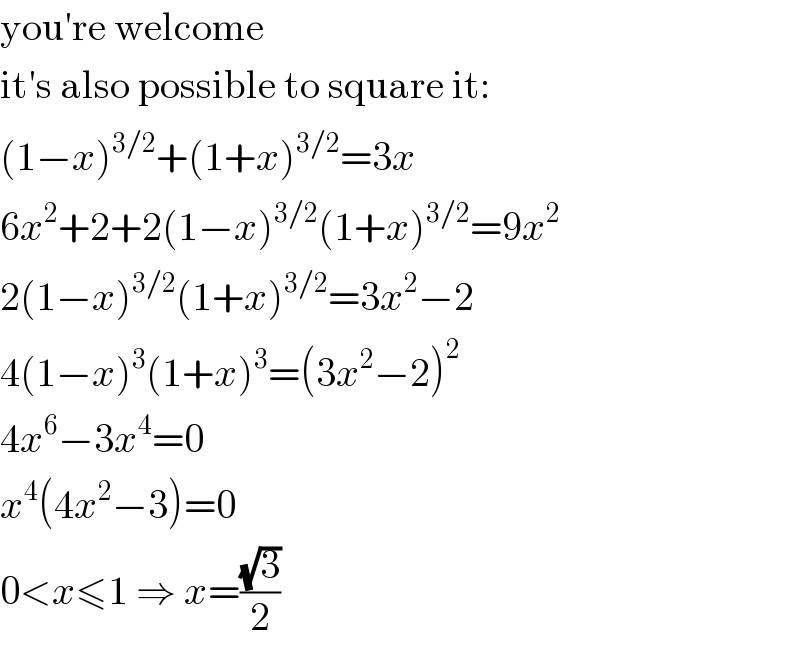Question Number 92605 by som(math1967) last updated on 08/May/20

Commented by behi83417@gmail.com last updated on 08/May/20
![(((1+x)(1−(√(1+x))))/(−x))+(((1−x)(1+(√(1−x))))/x)=1 ⇒(1+x)(√(1+x))−(1+x)+(1−x)(√(1−x))+(1−x)=x ⇒(1+x)(√(1+x))+(1−x)(√(1−x))=3x (−1<x<1,x≠0,let:x=cos2t)⇒ 2c^2 .(√2)c+2s^2 .(√2)s=3(c^2 −s^2 ) ⇒2(√2)(c^3 +s^3 )=3(c^2 −s^2 ) ⇒2(√2)(c+s)(c^2 +s^2 −cs)=3(c+s)(c−s) 1.c+s=0⇒(√2)cos(t−(π/4))=0⇒t=(π/4)(≡x=0:not ok) ⇒2(√2)(1−cs)=3(c−s) ⇒8(1−2cs+c^2 s^2 )=9(c^2 +s^2 −2cs) ⇒8c^2 s^2 +2cs−1=0 ⇒cs=((−1±(√(1+8)))/8)=(1/4),−(1/2) 1. cs=(1/4)⇒sin2t=(1/2)⇒x=cos2t=((√3)/2) 2. cs=−(1/2)⇒sin2t=−1⇒x=cos2t=0 [not ok]](https://www.tinkutara.com/question/Q92623.png)
Commented by Tony Lin last updated on 08/May/20
![let (√(1+x))=a,(√(1−x))=b,a^2 +b^2 =2 (a^2 /(1+a))+(b^2 /(1−b))=1 a^2 −a^2 b+b^2 +ab^2 =1+a−b−ab 1−ab(a−b)−(a−b)+ab=0 (1+ab)[1−(a−b)]=0 a−b=1 or ab=−1(false) (√(1+x))−(√(1−x))=1 1+x=(1+(√(1−x)))^2 2x−1=2(√(1−x)) 4x^2 −4x+1=4−4x x^2 =(3/4) x=±((√3)/2) but ((1−((√3)/2))/(1+(√(1−((√3)/2)))))+((1+((√3)/2))/(1−(√(1+((√3)/2)))))<0 (−5) ∴x=((√3)/2)](https://www.tinkutara.com/question/Q92629.png)
Commented by som(math1967) last updated on 08/May/20

Commented by som(math1967) last updated on 08/May/20

Answered by MJS last updated on 08/May/20

Commented by som(math1967) last updated on 08/May/20

Commented by MJS last updated on 08/May/20

Commented by som(math1967) last updated on 08/May/20

